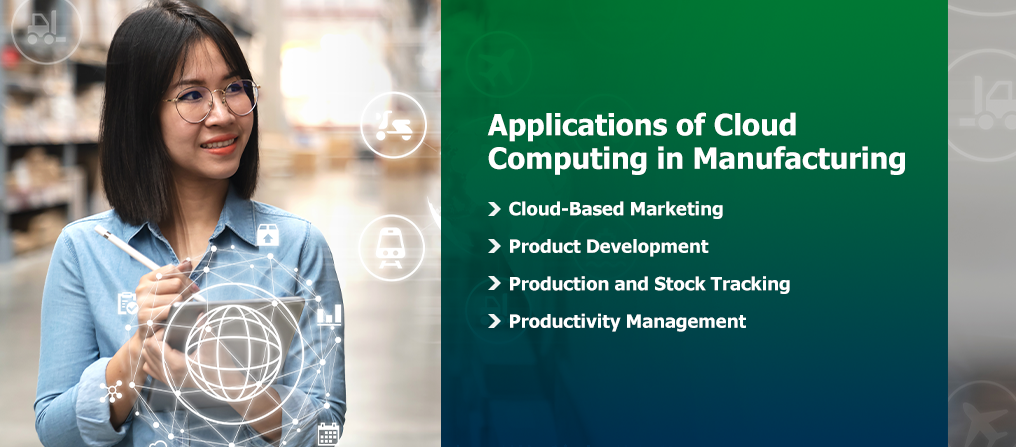In the complex and competitive world of manufacturing, where product quality and operational efficiencies are…

Table of Contents
- What Is Cloud Computing and How Does It Benefit Manufacturing?
- Applications of Cloud Computing in Manufacturing
- SaaS Solutions in Cloud Technology in Manufacturing
- Integrating Cloud Computing in Manufacturing
Today, the manufacturing industry must meet increasing demands for faster delivery and heightened production. Cloud technology can help manufacturers meet these needs. The future of all levels of the manufacturing industry will incorporate this technology to stay more securely connected with consumers and the supply chain.
Connectivity is already a pillar of efficient manufacturing. To stay connected, manufacturers must meet the technology standards used through the supply chain to address problems promptly.
Around the world, 90% of companies are using some type of cloud technology. The manufacturing industry must adapt to these global changes in connectivity and computing. By 2023, software used by manufacturers will be almost half cloud-based. The time to integrate cloud computing is now to avoid falling behind.
What Is Cloud Computing and How Does It Benefit Manufacturing?
Cloud computing uses internet connections to store software and information used in businesses. This technology has an increasing use in manufacturing business operations and production processes. In 2017, 25% of finished product inputs were made using some type of digital technology, such as cloud computing.
Compared to traditional technology that uses individual computers to have updated software for information processing, cloud computing offers several advantages. The benefits of cloud computing for manufacturers include the following:
- Reliability: Cloud-based technology has fewer technical problems than software used on individual computers.
- Cost savings: Cloud solutions do not require in-house servers.
- Scalability: Cloud computing grows with the business or can easily scale back during slower times.
- Less time wasted in updating computers: Technology based in the cloud stays updated without IT departments wasting time making sure everyone has the latest version of the software.
- Marketplace advantage over companies not using cloud technology: Better productivity and communications give companies that use cloud manufacturing solutions a competitive edge.
- Centralized management: Access programs can happen from any computer in the organization, improving management capabilities.
Smart manufacturing is a future-forward method of allowing computers and devices to communicate with each other to optimize productivity and efficiency. Smaller businesses that don’t have the IT infrastructure to implement smart manufacturing can leverage the applications of cloud technology. Cloud computing can make smart manufacturing possible for any size company.
For more information about cloud computing, see our piece “What Is Cloud Computing and How Does it Benefit Manufacturing?”

Applications of Cloud Computing in Manufacturing
In manufacturing, cloud computing offers numerous solutions for every part of the process, from marketing to productivity. Integrating cloud technology into multiple operational areas increases the benefits gained from using it. A few common applications of cloud computing in the manufacturing sector include the following.
Cloud-Based Marketing
The comprehensive nature of cloud technology makes it a natural match for the intricacies of marketing campaigns. Manufacturers use cloud-based applications to aid in planning, executing and managing marketing campaigns. By using data on production and sales, manufacturers can also track the effectiveness of marketing campaigns.
Product Development
Product planning and development tie heavily into production. By merging product planning and development information into supply chain data and communications, manufacturers can prepare their operations for full production. With comprehensive integration, products can move from idea to engineering to prototype to small production and finally to full-scale manufacturing and shipping much faster.
Production and Stock Tracking
Once production starts, cloud technology can benefit the process of producing and stocking products. With enterprise resource planning (ERP) software, companies can match their production levels to available stock and sales. The software can manage price quotes, order intake and customer requests. Fewer mistakes happen when using a standard product to track these, thus lowering order cycle times.
Productivity Management
Rarely do manufacturers maintain the same level of production for all products throughout the year. To meet the market’s changing needs, manufacturers can use cloud-based applications to monitor when to change production. Plus, by allowing communications throughout the supply chain, these software solutions ensure producers have the required amount of raw materials on hand and can readily change their orders to match their future productivity levels.
SaaS Solutions in Cloud Technology in Manufacturing
Cloud technology has three main forms — software as a service (SasS), platform as a service (Paas) and infrastructure as a service (IaaS). IaaS lets manufacturers of all sizes use an enterprise-level infrastructure to help with operation scaling, data storage and information processing. Companies use PaaS to develop their own applications in rented production or development solutions. Lastly, SaaS offers internet-based software programs for use by anyone in a company. Among these, SaaS ranks as one of the simplest solutions to quickly integrate into a business.
For example, a cloud-based ERP for manufacturing is a type of SaaS used in the industry. SaaS manufacturing software benefits include:
- Freeing companies from maintaining servers.
- Not needing to update locally stored software.
- No longer losing data from company computers or hard drives.
- Storing files in a secure, centralized location.
Manufacturing companies should embrace these benefits by integrating SaaS solutions into their operations more often. In using centrally based software solutions, businesses can enjoy several advantages.
Limited Misinformation or Disconnected Data
With a single software location, everyone refers to the same information and documents. When using cloud-based ERP, only one main source for company information exists. The prevalence of misinformation reduces because everyone uses the same source for company data.
Ease of Making Changes for the Future
Cloud technology’s scalability and constant updates make planning for the future simpler. Using a SaaS network avoids issues of outdated software or operating systems on an individual computer. By eliminating these concerns, SaaS makes integrating smart manufacturing technology and other future-forward solutions easier.
Improved Collaboration
By connecting to the same files in the same software, everyone in the SaaS network participates in data collaboration. Because they reference a shared document, they all have the most updated information for decision-making and planning. Even those located remotely can contribute to operations and collaborate on projects with cloud-based manufacturing software.
MANTEC Supports Integrating Cloud Computing in Manufacturing
Benefits of cloud technology for manufacturers include facilitating better communication, managing products throughout their life cycles and tracking inventory. Cloud-based manufacturing will be the industry’s future, but companies must lay the groundwork for it now. The question should no longer be why manufacturers should use cloud computing, but how can they implement it.
Get the assistance your business needs to bring your operations into the future with the help of MANTEC. As a nonprofit, MANTEC offers affordable services with unmatched return on investment (ROI). Contact MANTEC for support, training and solutions to bring your manufacturing company into the future of cloud-based operations.



